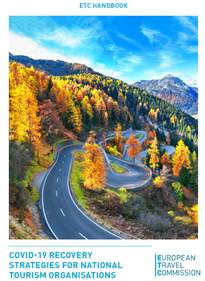‘Covid-19 Recovery Strategies for National Tourism Organisations’
Report by the European Travel Commission (Sept 2020)
- Review by Tom Buncle -

This is a timely, well-researched report, with some useful insights, instructive case studies, and robust recommendations: https://etc-corporate.org/reports/handbook-on-covid-19-recovery-strategies-for-national-tourism-organisations/
However, while its moral compass and signposts to a new future are beyond reproach, it doesn’t quite do what it says on the tin. It doesn’t live up to the promise of revealing NTO recovery strategies as fully as might be expected from the title. Nevertheless, this does not detract from its authority. It is a highly cogent report with a resolute sense of purpose and a potent call to action.
Sense of Direction
Perhaps the title sets the bar unrealistically high. Elaborating NTO strategies would take a tome far larger than this, very accessible, report. Instead, it provides glimpses of actions undertaken by NTOs to minimise the pandemic’s impact on their destinations, as promised by the report’s first two objectives:
‘to understand:

- Actions carried out by European NTOs to monitor and mitigate the impact of the COVID-19 pandemic'.
and
- 'Actions taken by European NTOs to support their respective national tourism industry and ensure the successful recovery of domestic and international tourism'.
It identifies some of the broad areas of activity NTOs are involved in with regard to crisis response (policy and strategy, tourism business support, communications, research and intelligence); and types of activity NTOs have undertaken in response to the pandemic (e.g. establishing an emergency response group, monitoring consumer sentiment, visitor communications et al). But there is limited detail beyond this level, which might give a more textured insight into specific actions by NTOs and reveal the strategic thinking underlying NTO crisis response tactics.
This is not to criticise the report’s valuable content. It is merely to rebalance expectations. As a preamble to addressing its objectives, the report explores national tourism organisations’ (NTOs) views on the impact of COVID-19 on their destinations, the challenges they face, and thoughts about the future. But it could have benefited from more fresh and granular insights into specific actions taken by NTOs to address these challenges.
In its third objective, ETC again appears to have set the bar ambitiously high, but nevertheless admirably purposefully: ‘to understand the role that sustainable tourism practices are playing as a key factor in determining the pace and characteristics of recovery.’ Few NTOs appear to be sufficiently committed to pursuing sustainable practices to enable ETC to unearth much insight into destination activity in this area. It is, therefore, perhaps unsurprising that few sustainable practices are identified as truly ‘determining the pace and characteristics of recovery’. This is in itself a telling revelation.
Nevertheless, a handful of case studies do offer insights into how a very limited number of destinations are implementing sustainable practices. They may be few in number, but they are searingly compelling examples, which address the report’s fourth objective: ‘to understand good examples of politics and practices taken at a national level that could be implemented at pan-European level in order to shape a more sustainable tourism ecosystem’. These are referenced briefly below.
Two overriding lessons emerging from the report’s research into NTO ‘recovery strategies’, which are now widely understood, are:
- the role of domestic tourism as potential destination saviour;
- the role of NTOs (and DMOs) as the communications interface between their country’s tourism industry and government. The value of this intermediary role lies in NTOs’ interpretation of industry needs to government, and in advising businesses on the implementation of government policy (e.g. hygiene and safety regulations).
These are important issues and a useful reminder of the role of an NTO. But they hardly amount to a detailed articulation of recovery strategies. Consequently, for readers hoping to glean nuggets of wisdom they might apply in developing recovery plans for their own destination, this report doesn’t deliver quite the scale of road map indicated by its title (‘Recovery Strategies’). A useful addition to address this might have been a strategic crisis recovery framework, comprising a prioritised compilation of key activities undertaken by NTOs to address the pandemic. But, to be fair, this may be beyond the report’s remit. A ‘how-to-do-it’ manual is a different kettle of fish from a survey of NTO activities in response to crisis.
But this is not to diminish its worth. There are several other very valuable elements to this report, which are both illuminating and thought-provoking for destination managers.
Recommendations, Case Studies and Trends
Chief amongst these is a number of robust recommendations from ETC on the way forward post-COVID-19 (even if these don’t stem from research amongst the participating NTOs). These are clear, sensible, and quite frankly, imperative for destinations to emerge successfully and sustainably into the brave new world post-COVID-19.

Amongst the case studies, which address the fourth objective (‘Good examples of politics and practices taken at a national level that could be implemented at pan-European level in order to shape a more sustainable tourism ecosystem’), the most enlightening come, unsurprisingly from the master craftspeople in sustainability, Norway, Iceland and Slovenia.
COVID-19-induced (or accelerated) trends have been extensively observed elsewhere. Nevertheless, their enumeration here completes the picture that destinations need to understand to begin operating effectively in a post-COVID-19 world: a desire for space (rural as opposed to urban), greater participation in outdoor activities, focus on wellbeing, interest in the natural environment, reduced consumption rates, respect for tourism’s impact on communities, and safety concerns.
Recovery Means Refocusing
Perhaps the most pressing need for transformation, as destinations struggle to recover, is highlighted by ETC, rather than by the NTOs interviewed: the need for a radical change in mindset and a reappraisal of NTO/DMO roles. 

Disappointingly, while NTOs seem to recognise the futility of marketing investment in the short-term and accept future budgets are likely to be lower, they appear to pay little more than lip service to the big issues, such as climate change, environmental impact, community cohesion, and sustainability. Few, apart from the aforementioned leaders in sustainability strategies, make any link between their role and the need for better destination management to address these issues.
Nor do NTOs acknowledge a possible need to refocus their remit and skills to make this happen. I suspect this is because most NTOs are set up to drive economic growth through marketing, not to address destination development holistically. Turkeys don’t vote for Christmas.
Nevertheless, there is a perhaps hesitant recognition that “budgets and priorities in the future could be rebalanced in order to pursue more environmentally or socially sustainable initiatives”. But, whether stemming from reluctance or diplomatic sensitivity, NTOs exhibited “a strong willingness not to declare at this stage, ………whether resources would be spent on more sustainability-oriented activities rather than traditional NTO areas such as promotion”. This non-committal response evokes uncomfortable echoes of Voltaire:.......“One day everything will be well, that is our hope. Everything's fine today, that is our illusion”
ETC, however, clearly gets this and the report benefits enormously from their broader perspective and consequent recommendations.
The Big Questions
ETC is to be applauded for stepping in to occupy the moral high ground where NTOs largely failed to comment.
ETC astutely and provocatively states “It will be important to start by asking “why tourism?” and encourage local and regional tourism leaders to do the same”. Spot on. This should always be the starting point in developing a destination management plan. 

This impels NTOs and DMOs to think about tourism’s impact – both positive and negative – which will lead to a more sustainable approach than just “more, more, more visitors”. Asking why a place wants tourism (or doesn’t), will result in an unambiguous set of objectives, from which a clear-sighted plan of action should then flow.
If any positive change is going to come from this pandemic, it has to be a change in mindset, which, as the report exhorts, means “moving beyond a purely economic focus to include parameters on the social and environmental impact of tourism” and on visitor value to the host community.
Nor is ETC afraid to stray beyond the familiar territory of the tourism sector and stimulate much-needed debate about broader economic issues: “The decline in tourism arrivals across Europe has also exposed the extent to which some neighbourhoods, towns or regions have become heavily dependent on tourism as a source of revenue, exposing the need for more diversified economies and stronger local supply chains”.
This is a welcome exhortation to think about the previously unthinkable and challenge the sacred cows of globalisation, which have all too often delivered economies of scale that have disenfranchised local communities.
Summary
In summary, this is an interesting snapshot of European NTOs’ attitudes and priorities; a useful, if high-level, framework for pandemic action by NTOs and DMOs; a handful of insightful case studies; and, above all, clear, constructive recommendations for the future. 

The recommendations, and the more compelling case studies, lift this report beyond being merely an interesting and well-researched observation of the status quo under the pandemic to a commendably forward-looking guide, galvanised by robust principles for refocusing future strategy.
But, perhaps most significantly for the recovery of tourism as a sustainable contributor to local and national economies and societies, it is the unequivocal sense of moral purpose running through this report that makes it most valuable.
ETC’s challenge to NTOs and governments to lift their sights above the purely economic benefits of tourism, and to adopt a more holistic, responsible, and socially considerate approach to the development of tourism, is the triumph of this report: “It will be vital to ensure that this recovery takes place in a way that reduces the negative impacts of tourism on the environment and on local communities, and provides a more balanced, equitable contribution to economic growth”.
In this, ETC has thrown down the gauntlet for a much-needed debate. Let’s hope governments and NTOs pick it up.

